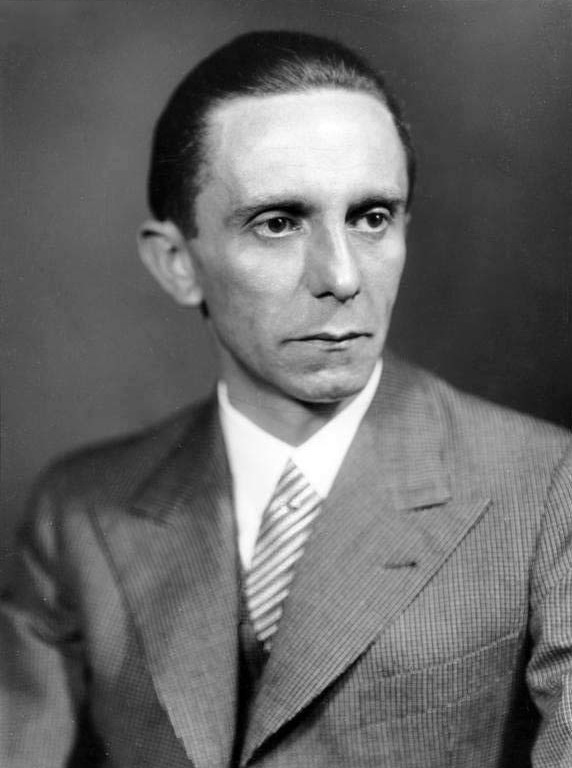Joseph Goebbels: Difference between revisions - Wikipedia
 Article Images
Article Images
Content deleted Content added
m |
m |
||
Line 47: Like others who were later prominent in the [[Third Reich]], Goebbels came into contact with the Nazi Party in 1923, during the campaign of resistance to the [[Occupation of the Ruhr|French occupation of the Ruhr]]. Hitler’s imprisonment following the failed November 1923 "[[Beer Hall Putsch]]" left the party temporarily leaderless, and when the 27-year-old Goebbels joined the party in late 1924 the most important influence on his political development was [[Gregor Strasser]], who became Nazi organiser in northern Germany in March 1924. Strasser ("the most able of the leading Nazis" of this period)<ref>Ian Kershaw, ''Hitler'', Volume I (W.W. Norton 1999), 270</ref> took the "socialist" component of National Socialism far more seriously than did Hitler and other members of the Bavarian leadership of the party. "National and socialist! What goes first, and what comes afterwards?" Goebbels asked rhetorically in a debate with [[Theodore Vahlen]], [[Gauleiter]] (regional party head) of [[Pomerania]], in the [[Rhineland]] party newspaper ''National-sozialistische Briefe'' (National-Socialist Letters), of which he was editor, in mid 1925. "With us in the west, there can be no doubt. First socialist redemption, then comes national liberation like a whirlwind… Hitler stands between both opinions, but he is on his way to coming over to us completely."<ref>Ian Kershaw, ''Hitler'', I, 272</ref> Goebbels, with his journalistic skills, thus soon became a key ally of Strasser in his struggle with the Bavarians over the party programme. The conflict was not, so they thought, with Hitler, but with his lieutenants, [[Rudolf Hess]], [[Julius Streicher]] and [[Hermann Esser]], who, they said, were mismanaging the party in Hitler’s absence. In 1925, Goebbels published an open letter to "my friends of the left," urging unity between socialists and Nazis against the [[capitalism In February 1926, Hitler, having finished working on ''[[Mein Kampf]]'', made a sudden return to party affairs and soon disabused the northerners of any illusions about where he stood. He summoned about sixty gauleiters and other activists, including Goebbels, to a meeting at [[Bamberg]], in Streicher’s Gau of [[Franconia]], where he gave a two-hour speech repudiating the political programme of the "socialist" wing of the party. For Hitler, the real enemy of the German people was always the Jews, not the [[capitalism|capitalists]]. Goebbels was bitterly disillusioned. "I feel devastated," he wrote. "What sort of Hitler? A [[reactionary]]?" He was horrified by Hitler’s characterisation of socialism as "a Jewish creation," his declaration that the [[Soviet Union]] must be destroyed, and his assertion that private property would not be expropriated by a Nazi government. "I no longer fully believe in Hitler. That’s the terrible thing: my inner support has been taken away."<ref>Ian Kershaw, ''Hitler'', I, 275</ref> Line 170: Goebbels remained preoccupied with the annihilation of the Jews, which was now reaching its climax in the extermination camps of eastern [[Poland]]. As in 1942, he was more outspoken about what was happening than Himmler would have liked: "Our state’s security requires that we take whatever measures seem necessary to protect the German community from [the Jewish] threat," he wrote in May. "That leads to some difficult decisions, but they are unavoidable if we are to deal with the threat… None of the Führer’s prophetic words has come so inevitably true as his prediction that if Jewry succeeded in provoking a second world war, the result would be not the destruction of the [[Aryan]] race, but rather the wiping out of the Jewish race. This process is of vast importance."<ref>"The War and the Jews," ''Das Reich'', 9 May 1943, online [http://www.calvin.edu/academic/cas/gpa/goeb37.htm here]</ref> Following the Allied invasion of Italy and the fall of [[Benito Mussolini]] in September, he and [[Joachim von Ribbentrop]] raised with Hitler the possibility of secretly approaching [[Joseph Stalin]] and negotiating a separate peace behind the backs of the western Allies. Hitler, surprisingly, did not reject the idea of a separate peace with either side, but he told Goebbels that he should not negotiate from a position of weakness. A great German victory must occur before any negotiations should be undertaken, he reasoned.<ref>Kershaw, ''Hitler'', II, 601</ref> The German defeat at [[Battle of Kursk|Kursk]] in July had, however, ended any possibility of this. Goebbels knew by this stage that the war was lost, but was unable to break the spell that Hitler had held over him since 1926. {{ As Germany’s military and economic situation grew steadily worse during 1944, Goebbels renewed his push, in alliance with Speer, to wrest control of the home front away from Göring. In July, following the Allied landings in France and the huge Soviet advances in [[Byelorussia]], Hitler finally agreed to grant both of them increased powers. Speer took control of all economic and production matters away from Göring, and Goebbels took the title Reich [[Plenipotentiary]] for Total War (''Reichsbevollmächtigter für den totalen Kriegseinsatz an der Heimatfront''). At the same time, Himmler took over the Interior Ministry. Line 225: Joachim Fest writes: "What he seemed to fear more than anything else was a death devoid of dramatic effects. To the end he was what he had always been: the propagandist for himself. Whatever he thought or did was always based on this one agonising wish for self-exaltation, and this same object was served by the murder of his children... They were the last victims of an egomania extending beyond the grave. However, this deed, too, failed to make him the figure of tragic destiny he had hoped to become; it merely gave his end a touch of repulsive irony."<ref>Fest, ''The Face of the Third Reich'', 97</ref> == References == Line 282 ⟶ 281: [[Category:Burials in Germany]] {{Link FA|ka}} [[ar:جوزيف غوبلز]] [[ast:Joseph Goebbels]] Line 307: [[it:Joseph Goebbels]] [[he:יוזף גבלס]] [[ka:იოზეფ გებელსი]] [[la:Iosephus Goebbels]] [[lb:Joseph Goebbels]] | |||